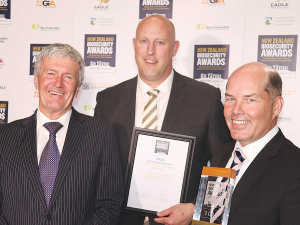NZ winegrowers advance vineyard biosecurity in 2025
The year was marked by “progress, collaboration and reflection” in biosecurity, says New Zealand Winegrowers Biosecurity Advisor Jim Herdman.
 Agriculture Minister Damien O'Connor with winners of the 2020 Biosecurity Supreme Award Miraka Dairy's Grant Jackson (centre) and Richard Wyeth.
Agriculture Minister Damien O'Connor with winners of the 2020 Biosecurity Supreme Award Miraka Dairy's Grant Jackson (centre) and Richard Wyeth.
Biosecurity is even more important to New Zealand as the country starts to recover from Covid-19.
That’s the message from Penny Nelson, head of biosecurity at the Ministry for Primary Industries. She told Rural News, at the recent biosecurity awards at Parliament, that biosecurity underpins our primary sector exports – as well as many of the special taonga we have. She says we just can’t afford to have big incursions at the moment.
“I was interested to hear that in the KPMG’s agribusiness survey, biosecurity has been the top issue for the past 11 years. I think New Zealanders realise we have a special way of life and we want to keep it.”
Nelson says the awards, which have been held for the last four years, are designed to celebrate the great things that a range of people in communities and industry are doing for biosecurity. She says every year there has been an increase in the number of entries and as word gets out about the awards, more and more people are becoming involved.
Close to 200 people attended the awards ceremony held in Parliament’s banquet hall and hosted by the Minister of Agriculture Damien O’Connor.
Taupo-based dairy company Miraka took the top honours – winning both the industry award and the supreme award for its Te Ara Miraka programme, which boosted biosecurity awareness and culture change within its farmer supplier base.
The programme incentivises farmers, by way of an increase in their annual milk payout, to improve a whole range of practices on their farms. These include environmental, milk quality, food safety, animal welfare, health and safety and biosecurity.
The awards recognised the fact that Miraka had identified that biosecurity was missing from the programme and set about working with external parties to develop a special training course. Each farmer was trained in biosecurity risk assessment, risk mitigations and how to create and implement a biosecurity plan within their business.
The supreme award was presented to the Miraka team by O’Connor who praised the company and its staff for its initiative and strong commitment to biosecurity.
The World Wide Sires National All Day Breeds Best Youth Camp Best All Rounder plaudit has become family affair, with 2026 Paramount Cup winner Holly Williams following in her sister Zara's footsteps.
DairyNZ is giving New Zealand farmers a unique opportunity to gain hands-on governance and leadership experience within the dairy sector.
Herd improvement company LIC has posted a 5.2% lift in half-year revenue, thanks to increasing demand for genetics.
According to the latest Fresh Produce Trend Report from United Fresh, 2026 will be a year where fruit and vegetables are shaped by cost pressures, rapid digital adoption, and a renewed focus on wellbeing at home.
The Roar is a highlight of the game hunting calendar in New Zealand, with thousands of hunters set to head for the hills to hunt male stags during March and April.
OPINION: The past few weeks have been tough on farms across the North Island: floods and storms have caused damage and disruption to families and businesses.